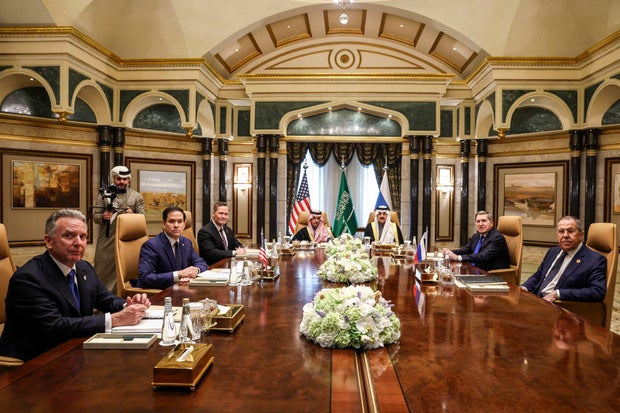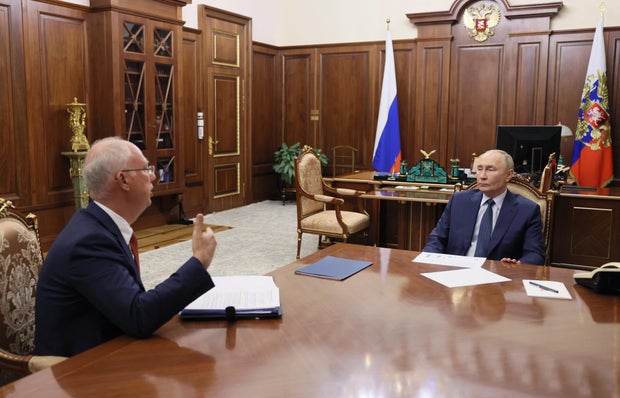/ CBS/AP
What could result from U.S.-Russia talks?
Riyadh, Saudi Arabia — Senior officials from Russia and the U.S. met in Saudi Arabia Tuesday to begin talks on improving ties and negotiating an end to the war in Ukraine. As CBS News correspondent Holly Williams reports, some felt the Trump administration had granted Vladimir Putin some degree of victory just by agreeing to hold the high-level meeting with his regime as the war he ignited with his full-scale invasion of Ukraine on Feb. 24, 2022 grinds on.
That sentiment may be felt most acutely by the leaders of Ukraine, who were not invited to participate in the initial discussion about the fate of their nation.
Delegations led by U.S. Secretary of State Marco Rubio and Russian Foreign Minister Sergey Lavrov met behind closed doors at the Diriyah Palace in Riyadh. The meeting marked another significant step in President Trump’s move to reverse three years of U.S. policy focused on isolating Russia over its war on Ukraine, and it is meant to pave the way for a likely meeting between Mr. Trump and Putin.

Speaking to reporters after the meeting, U.S. State Department spokesperson Tammy Bruce said the U.S. and Russian delegations had agreed to establish a “consultation mechanism to address irritants to our bilateral relationship.”
Bruce said Rubio and Lavrov had agreed to appoint “high-level teams to begin working on a path to ending the conflict in Ukraine as soon as possible in a way that is enduring, sustainable, and acceptable to all sides.”
Neither Bruce’s statement nor a read-out provided by the State Department said anything about involving Ukraine or its European neighbors in the negotiations. They said only that Mr. Trump was, “the only leader in the world who can get Ukraine and Russia to agree to” a ceasefire.
The spokesperson said the two top diplomats had also agreed to ongoing cooperation toward economic and investment opportunities “which will emerge from a successful end to the conflict in Ukraine.”
Ukrainian President Volodymyr Zelenskyy said Monday that his country wouldn’t accept the outcome of any negotiations conducted without Kyiv’s involvement.
President Trump earlier this month upended U.S. policy toward Ukraine and Russia by saying he and Putin had agreed in a phone call to begin negotiations on ending the war, leaving many Ukrainians feeling betrayed as they seemingly had no say in the matter.
Rubio was accompanied Tuesday by U.S. national security adviser Mike Waltz and Special Envoy Steve Witkoff, while Lavrov sat next to the Kremlin’s foreign affairs adviser, Yuri Ushakov.
The talks marked a significant expansion of U.S.-Russian contacts nearly three years into a war that has seen relations fall to the lowest level in decades.
“The economic aspect of the discussions”
In a possible indication of how Russia might frame its discussions with the Trump administration, senior Russian businessman Kirill Dmitriev, a Western-educated banker who now heads a government-created investment fund, was also taking part in the talks on Tuesday, according to Russian media.
“I will be responsible for the economic aspect of the discussions,” Dmitriev was quoted as saying by the Interfax news agency ahead of the talks in Riyadh. “The figure that we are voicing for the first time now is that American business has lost more than $300 billion by leaving the Russian market,” he said, apparently referring to the impact of sanctions imposed on Russia under former President Biden.
“Finding joint economic paths, positive solutions to issues, is extremely important, mainly for the U.S. and for many other countries that are beginning to understand that the Russian market is extremely attractive and that it is necessary to be present in it,” he said, adding that he hoped for “a positive dialogue.”

“We see that President Trump is very actively solving a large number of problems in the world and we hope that the Russian Federation’s position will be heard very clearly and the dialogue will continue,” Dmitriev said, according to Interfax.
Dmitriev, who studied at Stanford and Harvard before working early in his career at Goldman Sachs, previously served as an interlocutor between Moscow and Washington during Mr. Trump’s first term in office.
Ukrainians, Europeans sidelined from talks
The recent U.S. diplomatic blitz on the war has sent Kyiv and key allies scrambling to ensure a seat at the table amid concerns that Washington and Moscow could press ahead with a deal that won’t be favorable to them.
France called an emergency meeting of European Union countries and the U.K. on Monday to decide how to respond. French President Emmanuel Macron on Tuesday said he spoke by phone to Mr. Trump and Volodymyr Zelenskyy following the meeting.
“We seek a strong and lasting peace in Ukraine,” Macron wrote on X. “To achieve this, Russia must end its aggression, and this must be accompanied by strong and credible security guarantees for the Ukrainians,” he said as he vowed to “work on this together with all Europeans, Americans, and Ukrainians.”
Before that meeting, British Prime Minister Keir Starmer said for the first time Monday that the U.K. could deploy troops to Ukraine to help secure an eventual peace. Sweden also indicated a willingness Monday to deploy forces to Ukraine to keep an eventual peace.
While other European powers declined to make explicit commitments, calling discussions about deploying peacekeepers to Ukraine premature, Poland’s Prime Minister Donald Tusk ruled out sending Polish troops to the neighboring nation.
Ahead of the meeting in France, Tusk did stress that European powers should immediately spend more on defense.
“If we, Europeans, fail to spend big on defense now, we will be forced to spend 10 times more if we don’t prevent a wider war,” Tusk said on social media.
A boost for “the status of Saudi Arabia”?
Ahead of the Riyadh talks, Kirill Dmitriev, the head of the Russian Direct Investment Fund who the Kremlin said might join the meeting, underscored their importance in comments to The Associated Press.
“Good U.S.-Russia relations are very important for the whole world. Only jointly can Russia and the U.S. address lots of world problems, resolve for global conflicts and offer solutions,” Dmitriev, who said he and his team would focus on economic issues at the talks, told the AP.
The Saudi-owned satellite channel Al Arabiya, citing the Russian delegation, described Moscow’s priority as “real normalization with Washington.”
Diriyah Palace sits across the street from Riyadh’s Diplomatic Quarter. It’s also just next to the Ritz Carlton hotel, which became famous in 2017 after de facto leader Crown Prince Mohammed bin Salman detained other princes and the country’s elite there as part of what the royal court called a crackdown on corruption that also sidelined any potential challenge to his taking control of the kingdom.
Hosting the talks is a major step toward a goal Prince Mohammed has pursued throughout the war — putting the kingdom in the middle of diplomatic negotiations. The Saudis helped in prisoner negotiations and hosted Zelenskyy for an Arab League summit in the kingdom in 2023. Zelenskyy likely will travel to Saudi Arabia later this week.
For Prince Mohammed, once described as a “pariah” by former President Joe Biden over the 2018 killing of Washington Post journalist Jamal Khashoggi, hosting such talks burnish the otherwise-tarnished image the West has of him.
Ahead of the summit, the Saudi daily newspaper Okaz described the moment as the “world’s eye on Riyadh.”
Writing in the London-based but Saudi-owned newspaper Asharq Al Awsat, journalist Mishari al-Dhaidi described the summit as “a major step on the international political chess arena, revealing the status of Saudi Arabia and its positive influence for the benefit of all the people.”
The prince also has maintained close relations to Russia throughout its war on Ukraine, both through the OPEC+ oil cartel and diplomatically.
Hosting the summit also balances the harsh criticism recently levied by the kingdom’s tightly controlled media at Mr. Trump over his repeated comments that he wants the U.S. to “own” the Gaza Strip, which has been devastated by the Israeli military offensive there since the Oct. 7, 2023, Hamas attack. The Palestinians want Gaza and the West Bank for a future state, something backed by the wider Arab world and nearly all of the international community.


